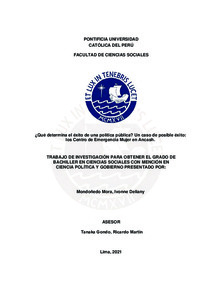| dc.contributor.advisor | Tanaka Gondo, Ricardo Martín | |
| dc.contributor.author | Mondoñedo Mora, Ivonne Deliany | |
| dc.date.accessioned | 2023-08-24T21:22:16Z | |
| dc.date.available | 2023-08-24T21:22:16Z | |
| dc.date.created | 2021 | |
| dc.date.issued | 2023-08-24 | |
| dc.identifier.uri | http://hdl.handle.net/20.500.12404/25775 | |
| dc.description.abstract | Las políticas públicas tienen una gran relevancia tanto para el Estado
como para la sociedad porque son las encargadas de buscarle una solución a
los problemas sociales que existan en el Perú. Es por ello que con la presente
investigación se ha intentado desarrollar un factor que permite el éxito de las
políticas públicas: la coordinación intersectorial, dicho termino se comprobará
con algunos ejemplos. Finalmente, se tomó como caso extra de análisis a la
política pública de género, siendo parte de ella, los Centros Emergencia Mujer;
pero utilizando como objeto de estudio a los de la región de Ancash. Se eligió
esta región debido a que es la segunda con mayor CEM en el Perú, después de
Lima; y con el fin de tener una investigación descentralizada. Asimismo, se
incluirá el contexto de la pandemia debido al COVID-19. | es_ES |
| dc.description.abstract | Public policy has a great deal of relevance for both the state and society
because public policy is responsible for solving the social problems that exist in
Peru. It is for this reason that the present investigation has attempted to develop
a factor that permits successful public policy: intersectional coordination; this will
be demonstrated through various examples. Finally, an additional case study
analyzing public policy on gender, in particular, Women’s Emergency Centers;
those centers in the region of Ancash will be used as the specific subject of study.
This region was chosen due to the fact that it contains the second highest amount
of Women’s Emergency Centers in Peru, second only to Lima. The focus of the
present investigation is a decentralized approach. Likewise, the context of
pandemic will be included due to the COVID-19 outbreak | es_ES |
| dc.language.iso | spa | es_ES |
| dc.publisher | Pontificia Universidad Católica del Perú | es_ES |
| dc.rights | info:eu-repo/semantics/openAccess | es_ES |
| dc.rights.uri | http://creativecommons.org/licenses/by/2.5/pe/ | * |
| dc.subject | Políticas públicas--Perú--Ancash | es_ES |
| dc.subject | Violencia contra la mujer--Perú--Ancash | es_ES |
| dc.title | ¿Qué determina el éxito de una política pública? Un caso de posible éxito: los Centro de Emergencia Mujer en Ancash | es_ES |
| dc.type | info:eu-repo/semantics/bachelorThesis | es_ES |
| thesis.degree.name | Bachiller en Ciencias Sociales con mención en Ciencia Política y Gobierno | es_ES |
| thesis.degree.level | Bachillerato | es_ES |
| thesis.degree.grantor | Pontificia Universidad Católica del Perú. Facultad de Ciencias Sociales | es_ES |
| thesis.degree.discipline | Ciencias Sociales con mención en Ciencia Política y Gobierno | es_ES |
| renati.advisor.dni | 06408442 | |
| renati.advisor.orcid | https://orcid.org/0000-0001-6640-1518 | es_ES |
| renati.author.dni | 72288953 | |
| renati.discipline | 312026 | es_ES |
| renati.level | https://purl.org/pe-repo/renati/level#bachiller | es_ES |
| renati.type | https://purl.org/pe-repo/renati/type#trabajoDeInvestigacion | es_ES |
| dc.publisher.country | PE | es_ES |
| dc.subject.ocde | https://purl.org/pe-repo/ocde/ford#5.06.00 | es_ES |






